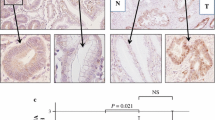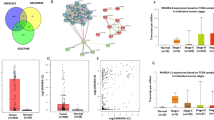Abstract
Background
Melanoma antigen-encoding gene-1 (MAGE-1), a cancer/testis antigen, has been reported to be expressed in various types of cancer. We investigated the clinicopathological features and prognostic significance of MAGE-1 expression in advanced gastric cancer (AGC).
Methods
Immunohistochemical staining for MAGE-1 was performed on surgical specimens obtained from 135 patients with AGC.
Results
Positive expression of MAGE-1 detected in cytoplasm was observed in 44 of 135 cases (32.6%) in primary tumors and 26 of 96 (27.1%) in lymph node metastases. In noncancerous gastric tissues, apparent MAGE-1 expression was not detected. MAGE-1 in primary tumor was correlated with advanced age (P < 0.001), macroscopic infiltrated type (P = 0.035), and presence of vascular invasion (P = 0.027). The 5-year cancer-specific survival rates of AGC patients with positive MAGE-1 expression were significantly lower than those of patients with negative MAGE-1 (positive: 31.6%, negative: 57.6%, P = 0.038). On multivariate analysis, MAGE-1 expression was not an independent prognostic predictor of AGC (P = 0.064). In differentiated AGC patients, MAGE-1 expression was correlated with advanced age (P = 0.003), macroscopic infiltrated type (P = 0.009), and presence of lymph node metastasis (P = 0.033). The cancer-specific survival rates of differentiated AGC patients with positive MAGE-1 were significantly lower than those of patients with negative MAGE-1 (P = 0.003). Positive MAGE-1 expression was an independent prognostic factor of differentiated AGC patients on multivariate analysis (P = 0.031).
Conclusions
These findings suggest that MAGE-1 protein expression can serve as a predictive marker of poor prognosis in differentiated AGC patients.


Similar content being viewed by others
References
van der Bruggen P, Traversari C, Chomez P, et al. A gene encoding an antigen recognized by cytolytic T lymphocytes on a human melanoma. Science. 1991;254(5038):1643–7.
Chomez P, De Backer O, Bertrand M, De Plaen E, Boon T, Lucas S. An overview of the MAGE gene family with the identification of all human members of the family. Cancer Res. 2001;61(14):5544–51.
Lucas S, De Plaen E, Boon T. MAGE-B5, MAGE-B6, MAGE-C2, and MAGE-C3: four new members of the MAGE family with tumor-specific expression. Int J Cancer. 2000;87(1):55–60.
Brasseur F, Marchand M, Vanwijck R, et al. Human gene MAGE-1, which codes for a tumor-rejection antigen, is expressed by some breast tumors. Int J Cancer. 1992;52(5):839–41.
Yoshimatsu T, Yoshino I, Ohgami A, et al. Expression of the melanoma antigen-encoding gene in human lung cancer. J Surg Oncol. 1998;67(2):126–9.
Inoue H, Li J, Honda M, et al. MAGE-1 mRNA expression in gastric carcinoma. Int J Cancer. 1995;64(1):76–7.
Inoue H, Mori M, Honda M, et al. The expression of tumor-rejection antigen “MAGE” genes in human gastric carcinoma. Gastroenterology. 1995;109(5):1522–5.
Honda T, Tamura G, Waki T, et al. Demethylation of MAGE promoters during gastric cancer progression. Br J Cancer. 2004;90(4):838–43.
Jung EJ, Kim MA, Lee HS, et al. Expression of family A melanoma antigen in human gastric carcinoma. AntiCancer Res. 2005;25(3B):2105–11.
Katano M, Nakamura M, Morisaki T, Fujimoto K. Melanoma antigen-encoding gene-1 expression in invasive gastric carcinoma: correlation with stage of disease. J Surg Oncol. 1997;64(3):195–201.
Suzuki S, Sasajima K, Sato Y, et al. MAGE-A protein and MAGE-A10 gene expressions in liver metastasis in patients with stomach cancer. Br J Cancer. 2008;99(2):350–6.
Inoue H, Mori M, Li J, et al. Human esophageal carcinomas frequently express the tumor-rejection antigens of MAGE genes. Int J Cancer. 1995;63(4):523–6.
Goodman JI, Watson RE. Altered DNA methylation: a secondary mechanism involved in carcinogenesis. Annu Rev Pharmacol Toxicol. 2002;42:501–25.
Jones PA, Baylin SB. The fundamental role of epigenetic events in cancer. Nat Rev Genet. 2002;3(6):415–28.
Tamura G. Genetic and epigenetic alterations of tumor suppressor and tumor-related genes in gastric cancer. Histol Histopathol. 2002;17(1):323–9.
De Smet C, De Backer O, Faraoni I, Lurquin C, Brasseur F, Boon T. The activation of human gene MAGE-1 in tumor cells is correlated with genome-wide demethylation. Proc Natl Acad Sci USA. 1996;93(14):7149–53.
De Plaen E, Arden K, Traversari C, et al. Structure, chromosomal localization, and expression of 12 genes of the MAGE family. Immunogenetics. 1994;40(5):360–9.
Takahashi K, Shichijo S, Noguchi M, Hirohata M, Itoh K. Identification of MAGE-1 and MAGE-4 proteins in spermatogonia and primary spermatocytes of testis. Cancer Res. 1995;55(16):3478–82.
Sadanaga N, Nagashima H, Mashino K, et al. Dendritic cell vaccination with MAGE peptide is a novel therapeutic approach for gastrointestinal carcinomas. Clin Cancer Res. 2001;7(8):2277–84.
Jang SJ, Soria JC, Wang L, et al. Activation of melanoma antigen tumor antigens occurs early in lung carcinogenesis. Cancer Res. 2001;61(21):7959–63.
Marchand M, van Baren N, Weynants P, et al. Tumor regressions observed in patients with metastatic melanoma treated with an antigenic peptide encoded by gene MAGE-3 and presented by HLA-A1. Int J Cancer. 1999;80(2):219–30.
Rogner UC, Wilke K, Steck E, Korn B, Poustka A. The melanoma antigen gene (MAGE) family is clustered in the chromosomal band Xq28. Genomics. 1995;29(3):725–31.
Sadanaga N, Nagashima H, Tahara K, Yoshikawa Y, Mori M. The heterogeneous expression of MAGE-3 protein: difference between primary lesions and metastatic lymph nodes in gastric carcinoma. Oncol Rep. 1999;6(5):975–7.
Japanese Gastric Cancer A. Japanese classification of gastric carcinoma—2nd English edition. Gastric Cancer. 1998;1(1):10–24.
Nakamura K, Sugano H, Takagi K. Carcinoma of the stomach in incipient phase: its histogenesis and histological appearances. Gann. 1968;59(3):251–8.
Rimoldi D, Salvi S, Reed D, et al. cDNA and protein characterization of human MAGE-10. Int J Cancer. 1999;82(6):901–7.
Kim JH, Jung EJ, Lee HS, Kim MA, Kim WH. Comparative analysis of DNA methylation between primary and metastatic gastric carcinoma. Oncol Rep. 2009;21(5):1251–9.
Kuwahara A, Katano M, Nakamura M, Morisaki T, Miyazaki K, Fujimoto K. Expression of melanoma antigen-encoding gene-1 predicts lymph node involvement in early gastric carcinomas. Dig Dis Sci. 2001;46(2):262–7.
Jass JR, Filipe MI. The mucin profiles of normal gastric mucosa, intestinal metaplasia and its variants and gastric carcinoma. Histochem J. 1981;13(6):931–9.
Lauren P. The two histological main types of gastric carcinoma: diffuse and so-called intestinal-type carcinoma. An attempt at a histo-clinical classification. Acta Pathol Microbiol Scand. 1965;64:31–49.
Nakajima T, Enomoto S, Ushijima T. DNA methylation: a marker for carcinogen exposure and cancer risk. Environ Health Prev Med. 2008;13(1):8–15.
Maekita T, Nakazawa K, Mihara M, et al. High levels of aberrant DNA methylation in Helicobacter pylori-infected gastric mucosae and its possible association with gastric cancer risk. Clin Cancer Res. 2006;12(3 Pt 1):989–95.
Reis CA, David L, Correa P, et al. Intestinal metaplasia of human stomach displays distinct patterns of mucin (MUC1, MUC2, MUC5AC, and MUC6) expression. Cancer Res. 1999;59(5):1003–7.
Tajima Y, Shimoda T, Nakanishi Y, et al. Gastric and intestinal phenotypic marker expression in gastric carcinomas and its prognostic significance: immunohistochemical analysis of 136 lesions. Oncology. 2001;61(3):212–20.
Waki T, Tamura G, Sato M, Motoyama T. Age-related methylation of tumor suppressor and tumor-related genes: an analysis of autopsy samples. Oncogene. 2003;22(26):4128–33.
Acknowledgement
The authors would like to thank M. Sakai, T. Kobayashi, E. Yamaki, and K. Araki for helpful discussions. We are also grateful to R. Aoyagi for excellent technical assistance.
Author information
Authors and Affiliations
Corresponding author
Rights and permissions
About this article
Cite this article
Ogata, K., Aihara, R., Mochiki, E. et al. Clinical Significance of Melanoma Antigen-Encoding Gene-1 (MAGE-1) Expression and its Correlation with Poor Prognosis in Differentiated Advanced Gastric Cancer. Ann Surg Oncol 18, 1195–1203 (2011). https://doi.org/10.1245/s10434-010-1399-z
Received:
Published:
Issue Date:
DOI: https://doi.org/10.1245/s10434-010-1399-z




